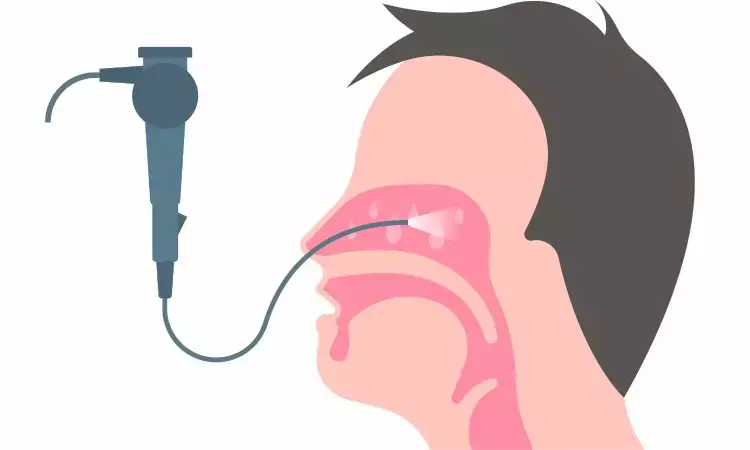- Home
- Medical news & Guidelines
- Anesthesiology
- Cardiology and CTVS
- Critical Care
- Dentistry
- Dermatology
- Diabetes and Endocrinology
- ENT
- Gastroenterology
- Medicine
- Nephrology
- Neurology
- Obstretics-Gynaecology
- Oncology
- Ophthalmology
- Orthopaedics
- Pediatrics-Neonatology
- Psychiatry
- Pulmonology
- Radiology
- Surgery
- Urology
- Laboratory Medicine
- Diet
- Nursing
- Paramedical
- Physiotherapy
- Health news
- Fact Check
- Bone Health Fact Check
- Brain Health Fact Check
- Cancer Related Fact Check
- Child Care Fact Check
- Dental and oral health fact check
- Diabetes and metabolic health fact check
- Diet and Nutrition Fact Check
- Eye and ENT Care Fact Check
- Fitness fact check
- Gut health fact check
- Heart health fact check
- Kidney health fact check
- Medical education fact check
- Men's health fact check
- Respiratory fact check
- Skin and hair care fact check
- Vaccine and Immunization fact check
- Women's health fact check
- AYUSH
- State News
- Andaman and Nicobar Islands
- Andhra Pradesh
- Arunachal Pradesh
- Assam
- Bihar
- Chandigarh
- Chattisgarh
- Dadra and Nagar Haveli
- Daman and Diu
- Delhi
- Goa
- Gujarat
- Haryana
- Himachal Pradesh
- Jammu & Kashmir
- Jharkhand
- Karnataka
- Kerala
- Ladakh
- Lakshadweep
- Madhya Pradesh
- Maharashtra
- Manipur
- Meghalaya
- Mizoram
- Nagaland
- Odisha
- Puducherry
- Punjab
- Rajasthan
- Sikkim
- Tamil Nadu
- Telangana
- Tripura
- Uttar Pradesh
- Uttrakhand
- West Bengal
- Medical Education
- Industry
AI may enhance accuracy and efficiency of nasal endoscopy, claims study

A team of researchers from Ochsner Health recently published an insightful article in the International Forum of Allergy & Rhinology exploring the application of convolutional neural networks (CNNs) to improve the accuracy and efficiency of nasal endoscopy. The study, authored by resident physician Dr. Vinayak Ganeshan under the guidance of senior otolaryngologist Dr. Edward D. McCoul, addresses the challenges posed by the intricate nasal cavity anatomy in rhinology diagnostics.
Nasal endoscopy (NE) is an essential diagnostic tool in rhinology, but its effectiveness can be hampered by the complex structure of the nasal cavity. The study investigated a CNN-based model designed to accurately localize and segment important landmarks in nasal endoscopy images. Images for the study were gathered from NE examinations conducted at Ochsner Medical Center in New Orleans between 2014 and 2023, using a standard digital endoscope. A total of 2,111 images underwent manual segmentation by three physicians.
The researchers configured the YOLOv8 object detection model to perform three tasks: classify the presence of a turbinate, detect its location, and apply a segmentation mask delineating its borders. Transfer learning was employed to refine the model's performance on NE images through backpropagation and stochastic gradient descent. By manually selecting hyperparameters and halting training upon a 15-epoch stall in validation performance, the model achieved impressive results.
The model identified the inferior turbinate (IT) and middle turbinate (MT) with an average accuracy of 91.5%, an average precision of 92.5%, and an average recall of 93.8%. At a 60% confidence threshold, the model's average F1-score stood at 93.1%.
"Our research demonstrates that convolutional neural networks can significantly enhance the precision of nasal endoscopy interpretation," stated Dr. Ganeshan. "Achieving an average accuracy of 91.5% in localizing essential anatomical structures like the inferior and middle turbinates marks a step forward in diagnostic efficiency and accuracy."
This successful deployment of the YOLOv8 model represents a substantial advancement in rhinology. The model's ability to accurately identify and segment the IT and MT could aid clinicians in diagnosing and treating sinonasal diseases more effectively. This progress is particularly advantageous for trainees and non-specialists who often encounter difficulties with the nasal cavity's complex anatomy.
"This study showcases the potential of CNNs to enhance nasal endoscopy's accuracy and efficiency," said Dr. McCoul. "By leveraging advanced AI technologies, we can markedly improve our diagnostic capabilities and provide superior patient care for those with sinonasal conditions."
Reference:
Vinayak Ganeshan , Jonathan Bidwell , Dipesh Gyawali, Thinh S. Nguyen, Jonathan Morse, Madeline P. Smith, Blair M. Barton, Edward D. McCoul, Enhancing nasal endoscopy: Classification, detection, and segmentation of anatomic landmarks using a convolutional neural network, International Forum of Allergy & Rhinology, https://doi.org/10.1002/alr.23384.
Dr Kamal Kant Kohli-MBBS, DTCD- a chest specialist with more than 30 years of practice and a flair for writing clinical articles, Dr Kamal Kant Kohli joined Medical Dialogues as a Chief Editor of Medical News. Besides writing articles, as an editor, he proofreads and verifies all the medical content published on Medical Dialogues including those coming from journals, studies,medical conferences,guidelines etc. Email: drkohli@medicaldialogues.in. Contact no. 011-43720751


